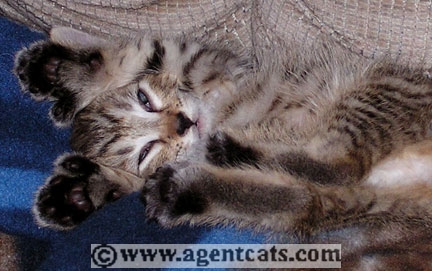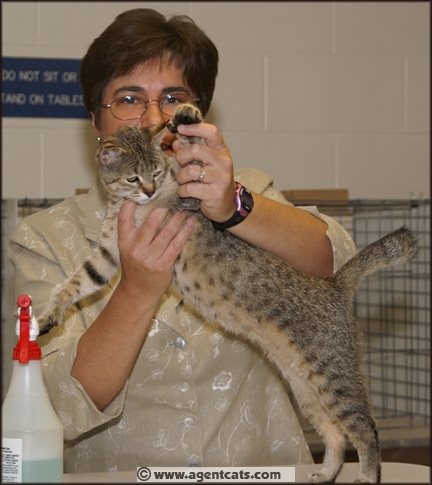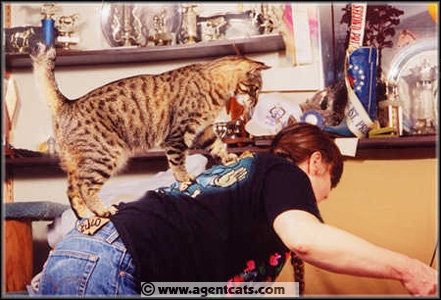Agency Training Course BRE101
How to find a Good Breeder.
Objective
Your objective is to locate an exceptional breeder of quality cats. This breeder should meet strict criteria. They should be honest, caring and responsible. If successful, you should feel like a family member, and be able to call for assistance whenever needed. If you excel in this lesson, you will have a new number added to your cell phone, and could have an additional option should you need to be rescued when your car breaks down in Cucamonga at 3 am.
Where to start
A good place to start would be to attend a cat show. A breeder who actively shows their cats demonstrates a commitment to excellence and an interest in improving the breed. They will be well informed on the breed's standards and will be looking to produce kittens who closely meet that standard.
 Attending cat shows also gives you an
opportunity to meet several different breeds of cats, talk with
breeders, and choose a breed that will best fit your heart and home.
You should also know that a TICA (The International Cat Association)
will have more breeds of cats at the show than a CFA, ACFA or other such
cat registry. TICA is the largest registry that accepts breeds
having (or believed to have) wild cat heritage, such as the Savannah,
Chausie, Bengal or the Pixie Bob. These other organizations do not
allow all of these breeds.
Attending cat shows also gives you an
opportunity to meet several different breeds of cats, talk with
breeders, and choose a breed that will best fit your heart and home.
You should also know that a TICA (The International Cat Association)
will have more breeds of cats at the show than a CFA, ACFA or other such
cat registry. TICA is the largest registry that accepts breeds
having (or believed to have) wild cat heritage, such as the Savannah,
Chausie, Bengal or the Pixie Bob. These other organizations do not
allow all of these breeds.
Another place to start is the internet.
Of course, you already know this because you are here. This
affords you the opportunity to research the physical characteristics and
personality traits of different breeds to see which fits your lifestyle
best. Don't trust any one site, but do your research.
Suggested Queries of Potential
Great Breeders
There are several questions you
could ask a breeder to help you determine if they are worthy of your
consideration to succeed in this mission. Listed below are a few,
not in any particular order.
1.) May I contact your
veterinarian or customers for recommendations?
The reason for this question,
and the result if they refuse, should be obvious. Breeders may
prefer holistic treatment, and that is wonderful, but there are times
when you need a veterinarian for a professional diagnosis, surgery, or
other procedures which shouldn't be attempted by someone without
professional training.
 2.) How do you raise and
socialize your kittens?
2.) How do you raise and
socialize your kittens?
Kittens must be raised in a home
environment to know how to react in one. A kitten cannot be
properly socialized if they are brought out of a cage for a few hours
everyday, or a couple of weeks. They need to be raised in an area
large enough to romp and play, and have an abundance of human contact
and love. How can they learn to use a scratching post instead of
furniture if they haven't lived with furniture? A higher energy
cat like the Pixie Bob, and especially the Savannah, needs to be
physical, climb, run, and have plenty of stimulating toys. Raising
a kitten underfoot makes a world of difference in the confidence and
affection they will have throughout their lives. Most breeders
will say they home raise their kittens. If you can visit the
cattery, do so and you can see how they are raised. If you cannot
visit the cattery, you must hone your detective skills. Listen
carefully to what the breeder says. Will you catch them in a lie?
Get a lot of photos, in a variety of poses, in natural environment and
actions. Look closely at those photographs. See beyond the kitten.
Observe everything. Be very wary of a breeder who does not allow
you to come to their home, but insists on meeting you in a parking lot,
hotel lobby, someone else's home or any such place. Many breeders
will use this "strange environment" as an
excuse for the kitten or cat being fearful, shy or aggressive.
There is no way for you to know if this is typical behavior, or truly
atypical.
3.) Do you have a contract/written
health and temperament guarantee?
If they don't have a contract,
ask why? What kind of written health or temperament guarantee do
they have? Be careful of the wording in a contract. Do they
use specific terms like "life threatening" or "known diseases" in their
contract? Be wary, as terms like these are very vague and release
the breeder from responsibility if you buy a sick cat, even if it dies.
We purchased a cat that came with a severe case of chlamydia and had to
pay the high expense of medication because the breeder, Michelle, didn't
consider it "life threatening". Breeders like this are looking to
avoid honoring a health guarantee. They usually don't honor
a guarantee even when it is legitimate per their own contract.
Michelle didn't honor the fertility part of her contract either, even
when we provided a veterinarian letter stating the cat was sterile.
This guarantee should be specific, including time limitations,
genetic problems and actions if there is a problem.
 4.) What is your kitten
return policy?
4.) What is your kitten
return policy?
A responsible breeder will have
a sales contract with a written health guarantee and require the cat be
returned if things don't work out. They want to be involved in the
future health and happiness of their kittens. They are there long
after the sale is completed. Of course, shipping cost is almost
never refunded.
5.) What is the kitten's health
history? And what health issues affect the breed?
You should hear specifics when
the breeder answers this question. The breeder should be able to
provide a pedigree, and know health issues in lines they breed, and any
genetic issues in the breed in general. Does this breeder test for
infectious diseases, such as leukemia or FIV? Are the parents of
the kitten still alive? If not, what were the reasons for their
death.
6.) How old are your kittens
when they go home?
Kittens should be at least 8 weeks old before
being weaned from their mom, and about 12 weeks when they go home. This gives them time to learn all
the essentials, such as good litter box habits and proper scratching
post usage. It also assures that they have a proper start on their
vaccinations, that they are eating well, and so on. Kittens do
develop at different levels, and that needs to be taken into
consideration. A kitten should never go home before he or she is
ready.
 7.) Is the litter registered?
7.) Is the litter registered?
Again, this is obvious. Reputable breeders don't have one price for registered kittens and
another for unregistered. They register all of their litters.
8,) How do you know which cats are show
quality, and which are pet?
If a breeder doesn't show, how would
they recognize a show quality kitten? Just because the kitten
doesn't have a disqualifying feature, doesn't mean it is a show kitten.
Cat show judges are paid to know the standard, and showing breeders see
their breeding from a third person standpoint. And, don't trust a
breeder who says the whole litter is show quality. A quality show
kitten isn't that common.
9.) What is the background
of your cattery?
How long have they been breeding?
How are they involved in the cat fancy? Is their cattery registered? Reputable
breeders work hard to produce their cats and are proud of their labors.
They don't sell to backyard breeders who don't care about the breed, or to pet stores.
They struggle to know where their cats are and want to make sure they
are happy.
10.) Will the kitten be
neutered or spayed before being sold?
Responsible, caring breeders place
their cats spayed or neutered, or have an altering clause in their
contract. Registration papers, or an application for registration,
will be withheld until veterinarian proof has been provided that the cat has been
altered (spayed or neutered).

What to Expect
Some questions may be asked by the breeder before you have a chance to ask. These topics should be addressed by someone during the initial interview. It is important that you work with a breeder who agrees with you on these important issues.
What is your policy on declawing?
You can expect not to be permitted to declaw
your cats from a good breeder. This is
very painful, and if done hastily, is inhumane. How would you like your fingers cut off at
the first knuckle? This is what is done when a cat is declawed.
It can cause constant, permanent pain. Some cats experience pain
simply stepping in the ruff sand of the litter box, so they stop using it.
Will the cat be allowed to
roam outside?
Because of the dangers of disease,
predators, vehicles and cat hating neighbors, you can expect that a breeder will
want to sell to only to someone that doesn't want to expose their cats
to these types of dangers. Why would anyone want to allow their
beloved pet to roam free? You wouldn't let your child run
unsupervised for hours.
Just as you quiz a breeder, expect a good breeder to quiz you about your lifestyle interests and priorities concerning your pet. You are looking for a good breeder. The great breeders are looking for a loving, life long home for their cherished babies. Expect to be asked some personal questions. Do you travel a lot? Why did you choose this breed of cat? Is anyone in the family allergic to cats? If so, has an allergist been consulted and given approval for a cat to be brought into the home? Are all the members of the household in the same mind about getting a cat? How and where will the kitten live? Do you have children or other pets? If so, what are the ages of children? What are the types and ages of the other animals? How do you feel about declawing, spaying/neutering or letting your cat outside? Do you smoke in the house?
You should be wary if the only question the breeder has for you is how you would like to pay. Beware a breeder who doesn't ask questions. If they don't care about the quality of life of the kitten, how much are they going to care about you after the money has changed hands?
Visiting the Breeder
 If at all possible, visit
the cattery before buying a cat from a breeder. If a breeder
doesn't allow you to see how the kittens are raised, this should present
a red flag in your research. Why? Are they hiding something?
Visiting different catteries will make choosing a breeder much easier.
If at all possible, visit
the cattery before buying a cat from a breeder. If a breeder
doesn't allow you to see how the kittens are raised, this should present
a red flag in your research. Why? Are they hiding something?
Visiting different catteries will make choosing a breeder much easier.
When you arrive, look around. Is there space for exercise, and places for climbing and clawing? Do they have clean, stimulating toys? Clean, dry bedding? Clean food bowls and litter boxes? If they are not raised in the home, is the area where the cats are kept properly ventilated and kept at a comfortable temperature?
Are the cats and kittens healthy, clean and
well groomed? Do they seem happy and playful? Is there
interaction between kittens, cats and the breeder? Are the kittens
attentive? Well socialized kittens shouldn't be fearful.
Look for kittens that don't hide or flee, but approach you.
Warning signs: dirty home, skittish cats, minimal interaction between
cats and people, sneezing, coughing, runny eyes or nose.
If you can't visit the cattery, get a lot of pictures. Look closely at the photos. It is amazing what they will reveal. Look for the same things you would look for if you were there in person. Are the kittens missing patches of hair? Do they look happy, relaxed, interactive, alert, playful? Do they look healthy? More care must be taken if you can't visit in person, but you must unlock the truth.
Okay, Agent Trainees. You have been equipped with vital knowledge, so now you must put it to use. Set high standards. Remember, talking to and visiting a breeder is an investment of time for both you and the breeder. Both parties should be courteous and respectful of this investment.
Go to Special Agent Pixie Bobs & Savannahs web site - www.agentcats.com